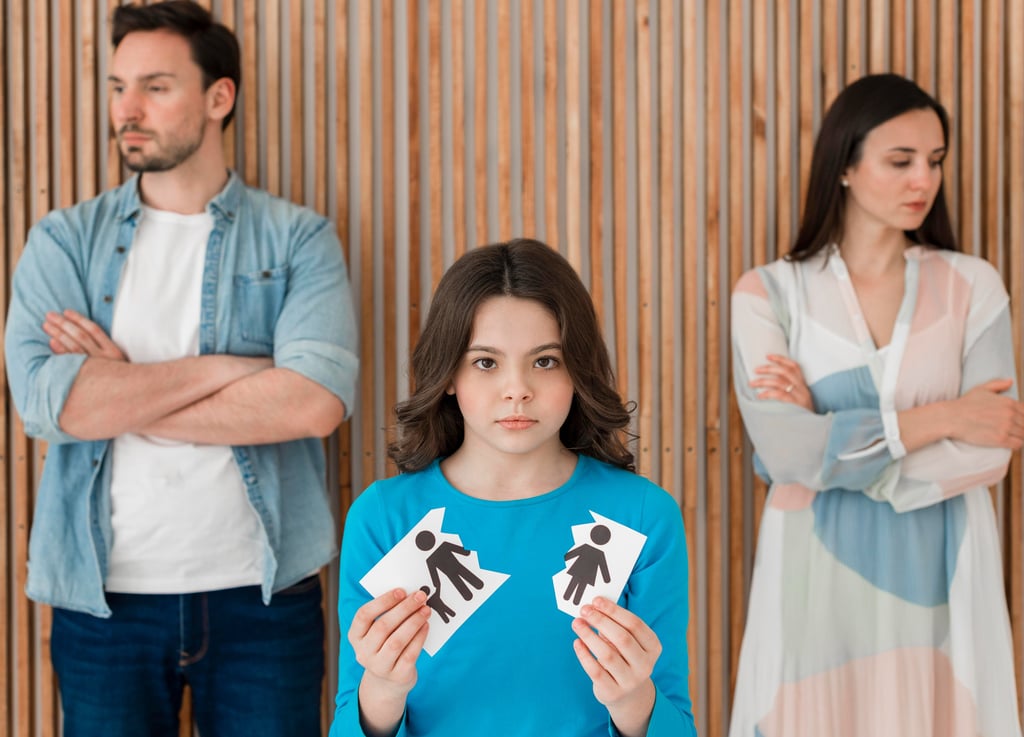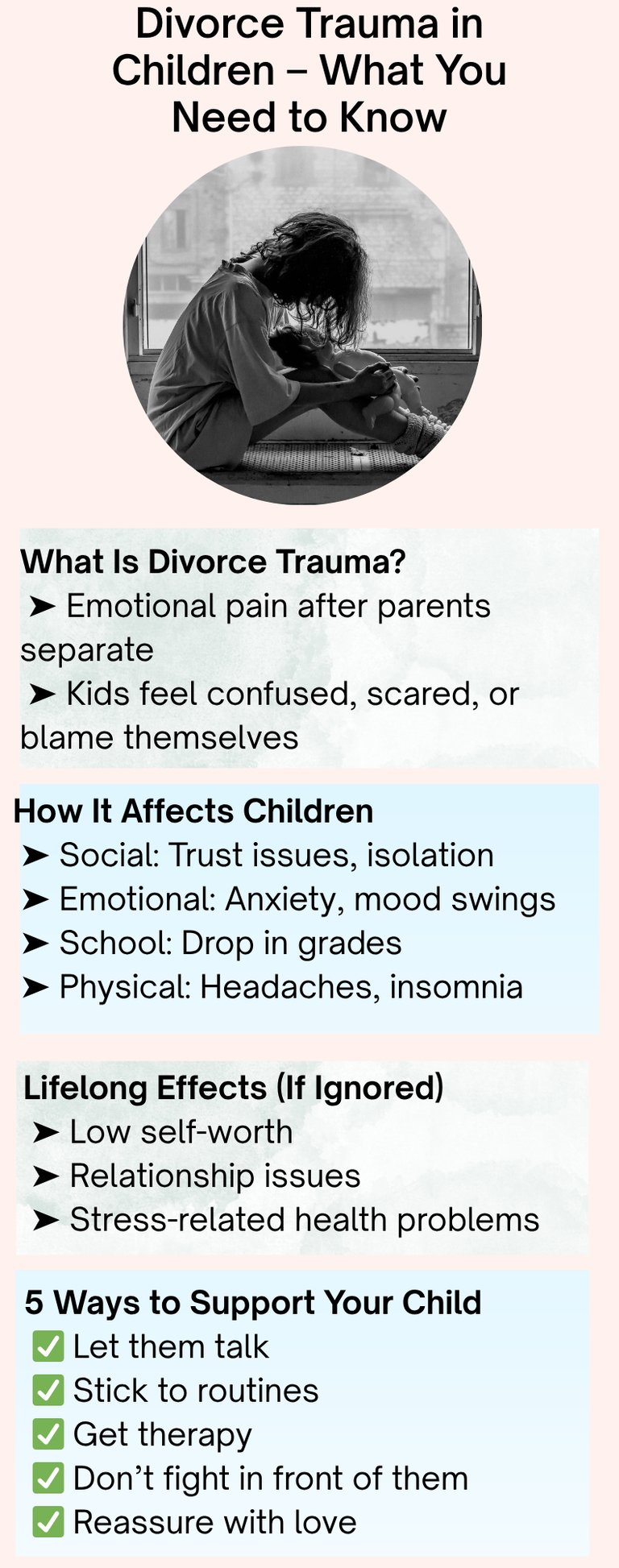When Parents Split: Understanding Divorce Trauma in Children
Child divorce trauma is the feeling of distress that the child goes through as a result of a parent’s divorce.
Faiza Zulfiqar
6/23/20256 min read


Divorce is always hard and it doesn’t only affect the couple separating. It also leaves a lasting impact on children. When parents separate, children may feel like their whole world has turned upside down. They may feel confused, scared, sad, or even responsible for the separation.
A sudden change in family dynamics can have a profound impact on a child’s development. It can also harm their physical health and emotional stability. That’s why parents, caregivers, and educators must understand what divorce trauma is. They should be aware of the signs children exhibit when they’re struggling. They should also learn what they can do to support them.
What Is Divorce Trauma in Children?
Child divorce trauma means the emotional distress a child feels when their parents go through a separation. This trauma is different for every child. It depends on the child’s age, personality, and the amount of emotional support they receive from adults around them.
It can take away the comfort of consistency in a child’s life. It can shake their emotional foundation. Many children feel lost. Some even feel abandoned.
Some children think the divorce is their fault. This can make them feel guilty and confused. Others may feel insecure or worry about what will happen next.
How Divorce Affects a Child’s Development
Every child experiences divorce in their way. Their age and emotional development influence how they cope with the changes. Young kids may develop separation anxiety. Teens might become distant or rebellious.
The following are some key developmental areas impacted by divorce:
Social Development Issues
Many children of divorced parents have trouble making friends or keeping relationships. They may have trust issues. The fear of being abandoned again makes it hard for them to trust others. Some children isolate themselves. Others may act out or become aggressive. They are trying to show feelings they don’t understand.
Academic Challenges
Divorce-related trauma can affect a child’s school performance. It becomes hard for children to focus or stay motivated. They may feel anxious or sad. They may not complete their homework or pay attention in class. Teachers may notice signs like restlessness, anger, or sudden mood swings. This happens because their routines change, and they struggle to adjust.
Emotional Regulation Difficulties
Kids going through divorce often feel overwhelmed by emotions they can't name or control. Their feelings can quickly swing from sadness to anger or confusion. Without help, they may struggle with emotional control. This can affect their future relationships and ability to handle stress.
Identity Formation
For teens, divorce can trigger an identity crisis. They may feel torn between two parents. Or they may struggle to define their role in the new family setup. This confusion can lead to low self-esteem, self-doubt, or long-term issues with self-worth.
Mental Health Effects of Divorce
Divorce trauma doesn’t just fade over time. Without support, the emotional pain can continue into adulthood. Here are some common mental health challenges children face:
Anxiety and Depression
It’s common for children of divorced parents to develop anxiety or depression. They may worry about switching homes, changing schools, or losing a parent's love. If these worries go unaddressed, they can develop into chronic emotional issues.
Low Self-Esteem and Guilt
Children often blame themselves for their parents’ divorce. This misplaced guilt can cause lasting damage. They may feel unworthy, incompetent, or overly responsible for keeping peace in the family. In adulthood, they may become perfectionists or people-pleasers as a means of compensation.
Behavioral Problems and Aggression
When children can’t express their feelings with words, they often act out. Younger kids might misbehave to show their pain. Teens might turn to risky behavior—like smoking, drinking, or breaking rules—to cope with emotional chaos.
Trust Issues and Attachment Problems
Divorce can damage a child’s ability to trust. When a child’s world breaks apart, they may start expecting betrayal in all relationships. This can lead to avoiding intimacy or becoming overly dependent on others to feel secure.


Physical Signs of Divorce Trauma
Stress from divorce doesn’t just affect the mind and emotions—it can also manifest in the body.
Sleep Disruptions
Children may struggle to fall asleep or anxiety can cause them to wake up during the night. They might have nightmares or develop insomnia. Over time, poor sleep can lead to fatigue, irritability, and academic difficulties.
Immune System Suppression
Ongoing stress weakens the immune system. Children going through divorce often get sick more frequently. They may catch colds, have stomach issues, or get headaches. Chronic stress disrupts the body’s ability to fight off illness.
Chronic Health Risks
Childhood stress is linked to long-term health problems. Kids affected by divorce may face higher risks of heart problems, weight issues, and diabetes as adults. It may also lead to unhealthy habits such as emotional eating or avoiding physical activity.
Psychosomatic Symptoms
Some kids develop physical symptoms caused by emotional distress. These might include headaches, stomachaches, or muscle pain. Psychosomatic symptoms are a cry for help from children who don’t yet know how to talk about their emotions.
Lifelong Effects of Divorce on Children
Divorce trauma can last a lifetime if not addressed. Children who go through divorce may have a harder time building healthy relationships when they grow up. They may struggle to trust or experience low self-worth. Some may even repeat unhealthy relationship patterns learned during childhood. They might fear commitment or avoid conflict at all costs. Others may carry emotional baggage into their roles as partners or parents.
5 Simple Tips to Support Your Child through Divorce
Divorce is never easy. However, there are steps parents and caregivers can take to reduce the emotional toll on children.
1. Encourage Open Communication
Give children space to talk about their feelings. Remind them that all their emotions are real and important. Listen without judgment. Reassure them that they are not alone and it’s normal to feel sad, mad, or confused.
2. Provide a Set Routine
Children need a routine. Try to keep fixed times for meals, sleep, and study. Do simple things like family dinners, weekend fun, or bedtime stories. These help children feel safe and calm during big changes.
3. Get Help from a Professional
Therapists and counselors can provide support to children during this hard time. They teach children how to talk about their feelings. They help them understand strong emotions. This support helps children manage stress and learn healthy coping mechanisms. If your child looks sad or stressed, don’t wait—get help early.
4. Avoid Conflict in Front of Children
Do not fight in front of your kids. Don’t blame each other. Don’t make children choose between parents. Ensure they never feel they must choose between parents. Make them feel you both are present for them. Keep them away from arguments.
5. Offer Reassurance
Reassure your children often. Tell your children you love them. Simple words like “We both love you very much” bring comfort. Say it often. It helps them feel emotionally secure.
Final Thoughts
Childhood is the best phase of a human’s life. It’s a time when children make memories, feel secure, and live happily. If you’ve decided to separate as parents, remember—your child still needs both of you. Take care of them. Please do your best not to let divorce trauma take away the beauty of their childhood.
Divorce can leave emotional and physical scars on children. However, with love, support, and care, divorce doesn’t have to ruin a child’s future. If parents and caregivers see the signs of divorce trauma early and do something about it, they can help the child feel better.
Children can become stronger. They can form healthy friendships and learn how to handle big feelings. Helping children through divorce is not about making everything perfect. What matters most is making sure they feel loved, secure, and heard. To all parents going through divorce: I hope you find peace, strength, and comfort during this hard time. May you raise your children with love, care, and hope even when things feel tough. You're trying your best, and that really matters.
FAQ: Child Divorce Trauma and Its Impact on Health
Q1. What is child divorce trauma?
A: Child divorce trauma means the stress or sadness a child feels when their parents get divorced. It can affect how they think, feel, and behave.
Q 2. What impact does divorce have on a child’s mental well-being?
A: Divorce trauma can make a child feel anxious, sad, angry, or confused. Some kids may think the divorce is their fault. These feelings can hurt their mental health if not handled early.
Q 3. Does divorce stress show up in a child’s body too?
A: Yes. When children feel stressed, it can cause headaches, stomachaches, or sleep disturbance. Some children may get sick more often or stop eating properly.
Q 4. What are signs that a child is going through divorce trauma?
A: Some signs include mood swings, trouble sleeping, poor grades, being quiet or irritable, or lack of interest in spending time with friends. Stress looks different for every child.
Q 5. How can parents help their child feel safe during a divorce?
A: Maintain daily routines consistent, especially for meals, sleep, and schoolwork. Don’t argue in front of the child. Let them talk about their feelings. Always remind them that both parents love them.
Q 6. When should we get professional support?
A: If your child remains consistently sad, angry, or stressed for a long time, a therapist or counselor can help. They help children understand their big emotions and learn how to manage them effectively.
Q 7. Can children recover from divorce trauma and live happy lives?
A: Yes! With love, support, and guidance, children can heal and grow stronger, maintain good mental and physical health, and build healthy relationships.
